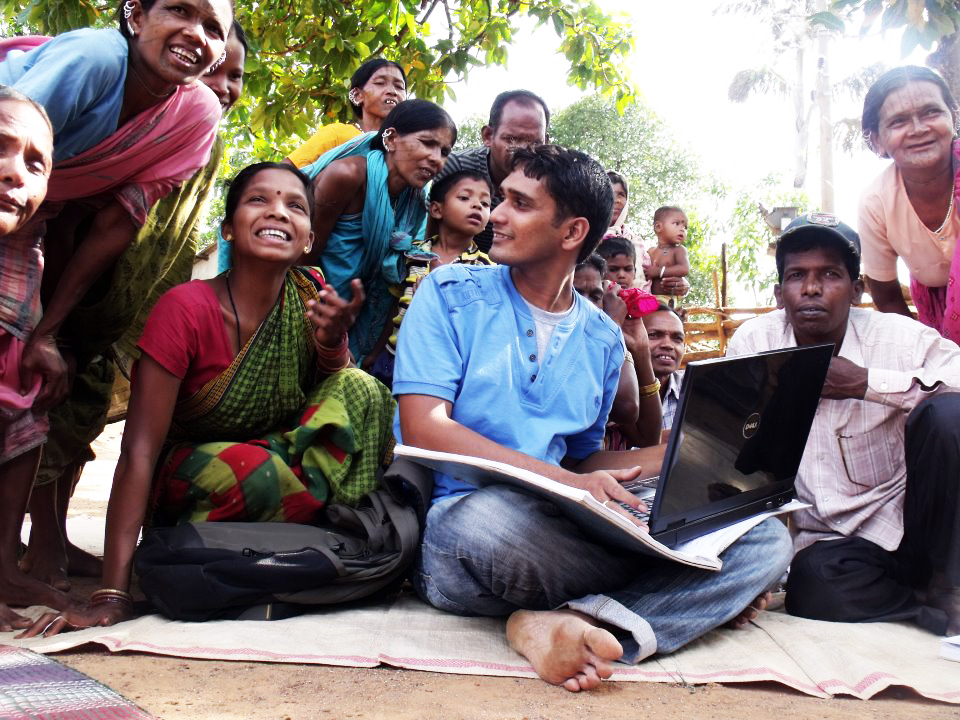Partnering for Progress
 One of the biggest challenges for women farmers in Odisha is to gain recognition as farmers and not just laborers. For most development agencies working in the state’s agriculture sector, the word farmer is synonymous with a man. Women farmers, especially those in the state’s tribal regions, remain unnoticed. Flying under the radar, women miss out on valuable opportunities to use and learn new technologies that can help reduce their drudgery. Besides, most agricultural machines are designed with the assumption that men will be the end users, so even when women access to these machines, they sometimes find the machines cumbersome or unusable. Numerous complementary schemes introduced to benefit farmers also often fail to recognize women’s needs and circumstances; the Kisan Credit Card, for example, is allotted based on land patta (legal record of rights), but women mostly do not have land in their name.
One of the biggest challenges for women farmers in Odisha is to gain recognition as farmers and not just laborers. For most development agencies working in the state’s agriculture sector, the word farmer is synonymous with a man. Women farmers, especially those in the state’s tribal regions, remain unnoticed. Flying under the radar, women miss out on valuable opportunities to use and learn new technologies that can help reduce their drudgery. Besides, most agricultural machines are designed with the assumption that men will be the end users, so even when women access to these machines, they sometimes find the machines cumbersome or unusable. Numerous complementary schemes introduced to benefit farmers also often fail to recognize women’s needs and circumstances; the Kisan Credit Card, for example, is allotted based on land patta (legal record of rights), but women mostly do not have land in their name.
Fostering Community Support
Against this backdrop, PRADAN is working with women to make collectives or self-help groups (SHGs) that foster the unity and support of their peers to address different life and livelihood issues such as gender, sanitation and agriculture. Besides sharing relevant success stories and examples, the group also helps women prepare seasonal agricultural plans; understand the importance of different inputs like seed, fertilizer and irrigation; access loans from the SHG/bank; connect with different government departments and provide the necessary knowledge and skills to be successful.
PRADAN also helps women identify the major drudgery-prone agricultural activities and gain access to relevant drudgery-reducing technologies, as well as access improved technologies to store their produce and establish the necessary market linkages to sell it. The objective is to involve women from the start of planning to the sale of the crop.
To achieve this goal PRADAN partners with local women’s federations, such as Sampurna and Swayamsiddha, who serve as the main grassroots-level partners who facilitate the actual social mobilization and technology adoption process among community members. Eventually, PRADAN will remove itself from this equation after having equipped the women with the tools to have greater control over their own agricultural decisions, activities and investments.
A Common Goal
As an example, PRADAN has been working with 37 households and three women’s SHGs in the remote forested village of Kanthikana in Jashipur block for the last six years. The major livelihood activities in the village, which is dominated by the Santhal tribe, are the collection of non-timber forest products and agriculture. This year, while planning their agriculture and other livelihood-supporting activities in their respective SHGs, it emerged that women had expanded the area under agriculture and had introduced new crops into their cropping systems. The SHGs provided financial credit to the women but they needed proper technological support in order to manage larger-scale cropping.
With support from PRADAN and CSISA, the women’s groups planted maize using garden seeders on 10 acres, undertook line sowing of rice in 5 acres, introduced sahbhagi dhan (a rice variety) to all families in the SHGs and facilitated three families to use manual spreaders for seed and fertilizer application. These interventions also allowed women to take up off-season vegetables like tomatoes and other creepers on 6 acres of land. As a result, all 37 families learnt new technologies and women were able to lead on these efforts, receiving direct training and sharing their knowledge with family members.
This collaboration is an example of how PRADAN and CSISA, together with local federations, are supporting women in agriculture by introducing relevant innovative technologies and practices and educating women on modern practices like zero tillage, seed-cum-fertilizer drills, timely application of herbicides and appropriate-scale mechanization. Participating women attained higher yields, reduced their drudgery and established themselves as successful farmers.
The article is authored by Satish Patnaik, Team Coordinator (Mayurbhanj, Odisha) for PRADAN, a national level Civil Society Organization working in seven Indian states with around 3,00,000 women (where each woman represents one family) with a vision of a just and equitable society with change in human conditions. In Odisha, PRADAN through its 52 executives, is working in six districts – namely Kandhamal, Rayagada, Koraput, Kalahandi, Keonjhar and Mayurbhanj – with 55,000 poor families.Tags: Gender, Mayurbhanj, Odisha, PRADAN
